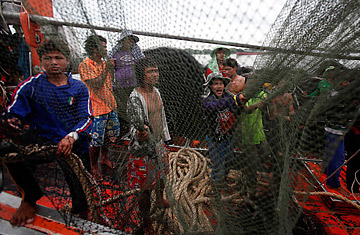
Migrant workers from Burma work on a fishing boat at the port of Mahachai, near Bangkok September 24, 2011.
(2 of 2)
Khun Mint says he was forced to work through a bad injury, got little rest, and was even coerced into taking amphetamines, to help him cast nets for longer hours.
So why didn't he leave?
He claims he had heard rumors that the police would arrest him, steal whatever money or valuables he had, and either sell him back to the ship's captain, or deport him. Andy Hall, a foreign expert on migrant labor issues at Mahidol University in Bangkok, says such shakedowns are common: "There's been systematic corruption, discrimination, exploitation, migrants are treated like walking ATMs."
Mo Swe, a Burmese political activist now living in Thailand says migrants are willing to put up with a lot, because the reality of being back home sounds even worse. "One reason is there is no employment in Burma. Another problem is different kinds of human rights abuses. Another reason is the lifestyle here. Electricity and water supply for 24 hours. The living standard is high. They can have light, they can watch the TV."
The plight of Burmese migrants in Thailand is becoming a more mainstream topic these days. In June the Thai government began a registration drive attempting to get as many foreign workers legalized as possible. Hall says getting formalized can make a big difference. "You can avoid a lot of exploitation by the police, you are protected more, you can negotiate with your employer more."
Around a million Burmese workers turned out for the recently completed government survey. Hall says it's anybody's guess how many Burmese workers didn't register. He says many don't have a formal employer, are unemployed, or have employers who don't want to cover their registration fees. He says registrations aside, the main need is for a cultural shift in how migrant laborers are viewed and treated. "So unless we see a real change of attitude by Thai employers, by Thai officials, by the Thai population as a whole, then a lot of these positive developments will not have the impact they should have."
For his part, Khun Mint says he's happy to still be in Thailand, but glad his fishing days are in the past. "Working with someone who doesn't value human life, who don't treat people well. It's not worth the dangers."
